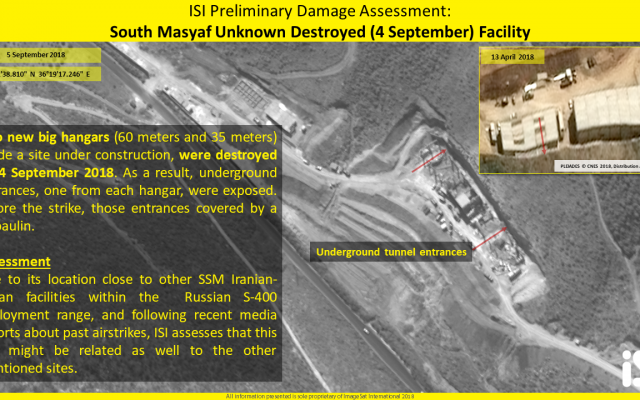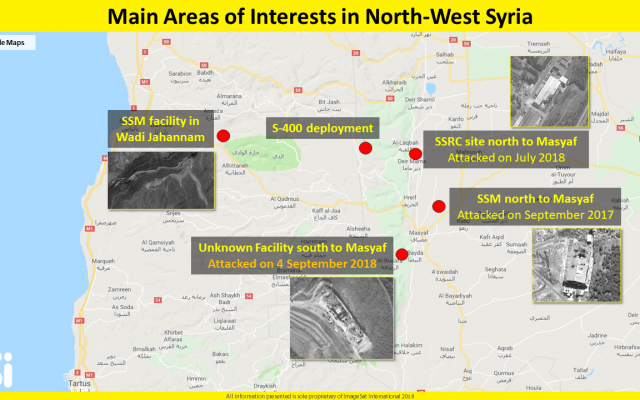Explosions destroy two large hangars and reveal tunnel entrances leading underground, says imaging service

An Israeli satellite company published images Wednesday it said showed the damage at a military site in Syria from an airstrike a day before that was attributed to Israel.
The rare daytime strike reportedly targeted Iranian assets between the town of Masyaf and Wadi al-Uyun.
Photos taken from space showed two large hangars, 60 and 35 meters in length, destroyed in the attack, said ImageSat International (ISI).
The raids also revealed entrances to underground tunnels, one leading from each hangar, which were previously covered by tarpaulins, ISI said.
“Due to its location close to other surface-to-surface missile Iranian-Syrian facilities within the Russian S-400 [air-defense system] deployment range, and following recent media reports about past airstrikes, ISI assesses that this site might be related as well to the other mentioned sites,” the company said.

The Syrian military claimed air defenses successfully intercepted several missiles launched by Israeli warplanes, though Damascus often inflates the number of missiles it intercepts.
Israel does not regularly comment on alleged strikes in Syria, though the reported attack came hours after the IDF confirmed it had carried out over 200 strikes in the country over the past 18 months.
The IDF on Tuesday acknowledged that it had conducted airstrikes against over 200 Iranian and Hezbollah targets in Syria since 2017, shedding light on its largely quiet activities across the border to prevent Tehran from establishing a permanent military presence in the war-torn country.
For years, Israel has been concerned that Iran was using opportunities presented by the Syrian civil war to entrench itself militarily in the country in order to further threaten the Jewish state — alongside the threat already posed by Iran’s proxy, Hezbollah, in Lebanon.
Israel has vowed to prevent such a military presence, but officially remains mum on most of the military’s efforts to do so.
Also Wednesday, Prime Minister Benjamin Netanyahu said Israel is working to thwart the production of precision missiles that can be used against the country “both near and far.”
“Israel is determined to prevent Iran and its proxies from establishing a military presence in Syria,” Netanyahu told ministers at the start of the weekly cabinet meeting.
“We are taking strong action against these attempts and against the attempts to produce precision weaponry in all sectors, near and far. We will continue to take such action on behalf of the security of Israel,” he said.
The 202 targets hit in the Israeli airstrikes since 2017 were mostly shipments of advanced weaponry, as well as military bases and infrastructure, which the IDF officials said drove Iranian forces to abandon some posts.
In addition, Jerusalem has tried to get the Islamic Republic out of Syrian through diplomatic means by appealing to the two main power-brokers in the region: Russia and the United States.
While Russia does not seem to have accepted Israel’s demand for Iran to be completely removed from Syria, it has agreed to force the Islamic Republic’s forces and proxies to leave the areas closest to the border with Israel.
According to some reports, pro-Iranian forces would be required to stay 40 kilometers (25 miles) away from the border; others indicate that range would be set at 80 kilometers (50 miles).
As reported by The Times of Israel
